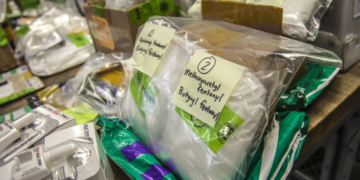The ingredients to make fentanyl are incredibly easy to purchase from China and ship to North America, Reuters reported on Thursday.
Reuters spent the past year obtaining ingredients that chemists advised them are precursors to fentanyl, as well as equipment to make pills, in order to demonstrate how easy it is to procure fentanyl ingredients with only an internet connection, according to its report. Out of the $3,600 of mostly Bitcoin spent on acquiring the chemicals, Reuters estimated the total product created from the ingredients holds an estimated street value of $3 million.
Twelve of the fourteen orders that arrived contained fentanyl precursors, with the last two being fakes — one containing sugar and the other lidocaine, a popular anesthetic, chemists told Reuters. The packages were disguised as mundane items to evade authorities, such as “adapter[s],” “computer accessories,” and “door knob[s].”
Reuters reporters used eight suppliers, with seven of them being based in China, with some under indictments from the Department of Justice (DOJ). The process involved going on both the dark web and regular websites that advertised the ingredients, with shoppers usually communicating over secure messaging such as Signal, Telegram and WhatsApp, according to the outlet.
One such company, Hubei Amarvel Biotech, was indicted by the DOJ in 2023 along with three Chinese nationals, according to court documents. The indictment alleges that Amarvel knowingly attempted to deceive law enforcement by mislabeling shipments containing fentanyl precursors to the U.S.
“What we sell is completely legal in China, but the United States always uses this matter to criticize us, and they even pose as buyers to get our information and slander our country,” the Amarvel-associated supplier told Reuters. “I hate all Americans, they use it (fentanyl) themselves and blame us.”
The DOJ indicted at least a dozen Chinese suppliers since mid-2023, but some of those suppliers remained in business, and even were involved in supplying Reuters with the precursor chemicals, according to Reuters. The Amarvel-associated supplier Reuters communicated with said the indictment “has no impact on us.”
“It’s like making chicken soup,” a fentanyl cook in the Sinaloa state of Mexico told Reuters about the process. “It’s mega-easy making that drug.”
Piperidines, an essential compound to make fentanyl, are also used to create everyday products, such as insecticides and fragrances, according to Reuters. Therefore, regulation can be challenging.
The list of chemicals Reuters used to obtain the ingredients was part of the “Gupta method” of producing fentanyl, according to the outlet. The ingredients included were piperidine, aniline, (2-bromoethyl)benzene and propionyl chloride.
(2 bromoethyl)benzene is used in fragrances and pharmaceuticals, according to the National Institutes of Health.
Mexico and China are well-known pathways for fentanyl to enter the U.S., with China being the primary source, according to a 2020 Drug Enforcement Administration report.
DOJ Office of Public Affairs Deputy Director Wyn Hornbuckle told the Daily Caller News Foundation that the department would continue to prosecute those involved in the fentanyl supply chain, including those in China.
“In the last year, DEA investigations resulted in the Justice Department bringing charges against actors in every stage of the global supply chain—from China to Mexico to the United States,” Hornbuckle said. “The United States has robust regulatory requirements that must be met by anyone involved in the manufacture, distribution, or importation of chemicals and pill-pressing machinery that can be diverted to the illicit fentanyl trade.”
“The DEA routinely investigates transactions involving these chemicals and machinery – including the plates used to stamp pills with counterfeit markings to make them appear like legitimate pharmaceuticals,” he continued. “People and companies who fail to follow U.S. law in this area are subject to a range of penalties, from regulatory sanctions to criminal prosecutions.”
Featured Image Credit: Flickr/U.S. Customs and Border Protection photo by Kris Grogan
All content created by the Daily Caller News Foundation, an independent and nonpartisan newswire service, is available without charge to any legitimate news publisher that can provide a large audience. All republished articles must include our logo, our reporter’s byline and their DCNF affiliation. For any questions about our guidelines or partnering with us, please contact [email protected].

















 Continue with Google
Continue with Google